Ramanarayanan (Ram) Mahadevan
CEO
Jiva
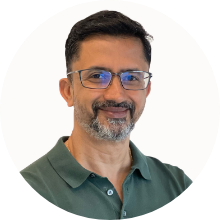
Ramanarayanan (Ram) Mahadevan
CEO
Jiva
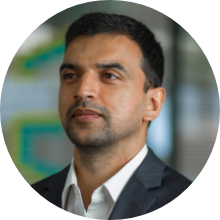
Somesh Kumar
Co-founder and Head of Product
AquaEasy
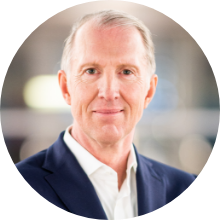
Dr Ullrich Wegner
Group CEO
Cremer
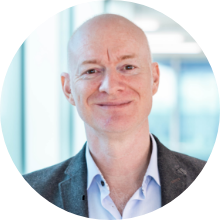
Dr Ian Roberts
Chief Technology Officer
Bühler
Climate change, supply chain disruptions and rising food prices coupled with a surging global population and food demand are signs of a looming global hunger crisis. This begs the question: How will the world ensure there is enough food for all in the decades to come?
In Singapore, businesses are approaching this mammoth task by serving up new innovations that will feed an increasingly hungry planet and its future generations.
Jiva has millions of farmers on its agritech platform, which predicts harvest conditions to reduce risk of crop failure. AquaEasy (a venture under Bosch) helps shrimp farmers improve yield by up to 30 per cent using software and monitoring systems for water conditions. Meanwhile, Cremer and Bühler are developing nutritious and sustainable plant-based proteins to reduce dependence on meat-based options.
Ramanarayanan (Ram) Mahadevan, CEO of Jiva; Somesh Kumar, co-founder and head of product at AquaEasy; Dr Ullrich Wegner, Group CEO of Cremer; and Dr Ian Roberts, Chief Technology Officer at Bühler, discuss how they are holistically tackling food issues.
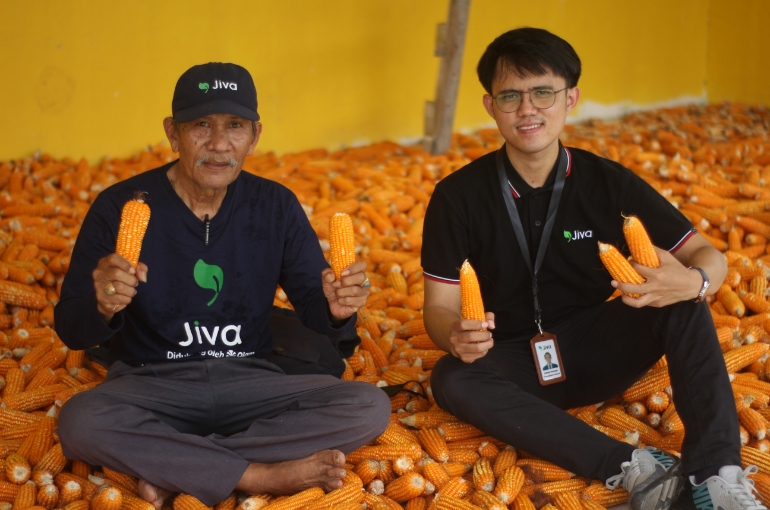
Photo credit: Jiva
Ram: The 500 million smallholder farmers Jiva aims to help are responsible for producing up to 70 per cent of the world’s food. Yet they struggle to generate enough income to sustain themselves. Many quit farming for other jobs, putting farming at risk. Our dream is to break the cycle and reignite a sense of excitement in smallholder farming. If we can inspire the next generation of farmers and rural entrepreneurs with digital ecosystems that create sustainable livelihoods, we can play a role in alleviating poverty, bolstering food security.
Somesh: Oceans have been our primary source of seafood, but with decades of overfishing and the effects of climate change, business as usual is no longer possible. AquaEasy wants to transform the aquaculture industry, feed the world and protect our planet. We use AIoT solutions to increase shrimp farmers’ productivity, profitability and sustainability.
Ullrich: The production of delicious, affordable and climate-friendly plant-based food is key to feeding growing populations. We believe that offering nutritious and sustainable alternatives will alleviate the global hunger crisis and protect our natural environment.
Ian: We have a strong commitment not only to provide staple food for the world, but to do this within planetary boundaries. We aim to play a significant role in feeding 10 billion people by 2050, while ensuring that we mitigate climate change, restore nature and biodiversity, and enable an equitable distribution of wealth.
Ram: Our personalised agronomy advisory, Jiva’s Agronomy Nudge Brain, provides “bite-sized” actions for farmers to follow based on their location, seed types, planting time, and current weather data — directly to their smartphones. Jiva can accurately determine when a farmer should spray pesticide, add the correct fertiliser balance for his location, even predict harvest dates, ultimately empowering them to make more informed decisions for healthier harvests.
Somesh: Shrimp farming is risky – up to 22 per cent production is lost to diseases. Maintaining good water quality is critical, but the complex interaction of physical, chemical, and biological parameters make it extremely challenging. AquaEasy uses state-of-the-art sensors, coupled with our AIoT software, to continuously monitor critical water parameters, and adapt feeding to shrimps’ appetite. We have been able to achieve 30 per cent improvement in feed conversion rates and faster shrimp growth. On several occasions, our system alerted farmers on, among other things, a sudden drop in oxygen levels due to aeration system failure, high ammonia levels due to poor nitrification, or even erratic patterns of shrimp behaviour – all reduced risk of crop failure.
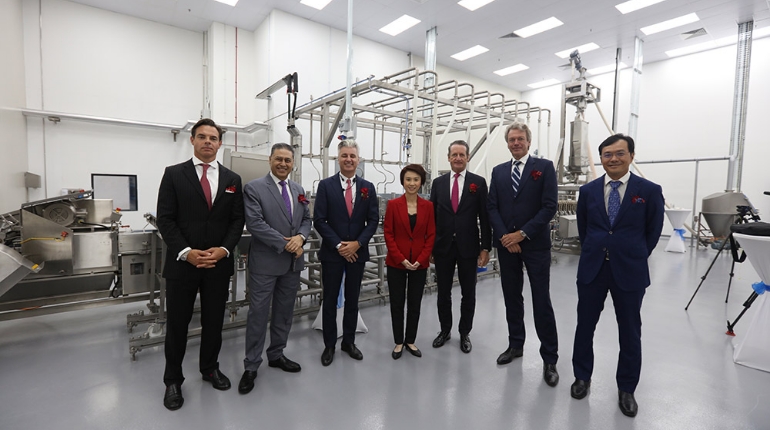
Photo credit: Cremer
Ullrich: Tapping on our production expertise in feed and food, we’ve embarked on new initiatives to innovate climate-friendly plant-based food that will support the global food ecosystem. Our recent joint venture with Nurasa, a wholly-owned company of Temasek in Singapore, is the Cremer Sustainable Foods facility, which will provide contract manufacturing facilities to partners in Asia who require high-moisture extrusion technology to produce texturised proteins that resemble meat. In short, we are manufacturing innovative alternative protein products in Singapore, for Asia.
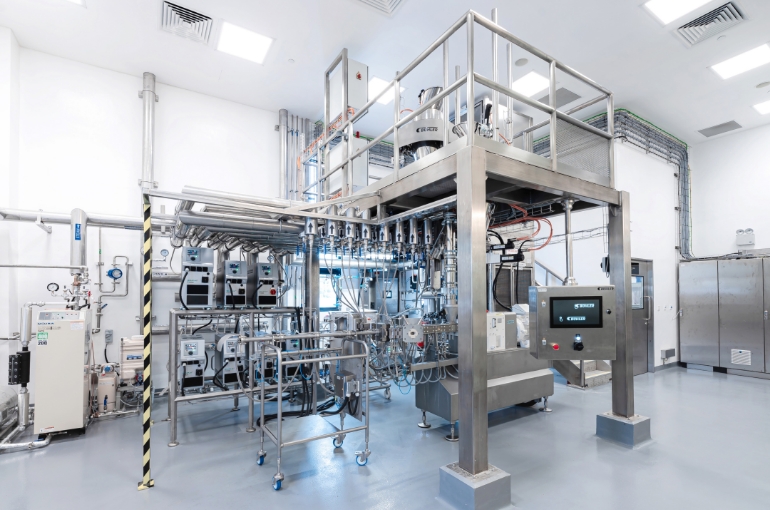
Photo credit: Bühler
Ian: Climate change, increasingly depleted resources, and a growing global population expected to exceed 10 billion people by 2050 require a reimagination of our food system. Tackling these global issues calls for new business models and novel solutions. At Bühler, we build strong partnerships to mitigate climate change together. In Singapore, we teamed up with Givaudan to open the Protein Innovation Centre to develop end-to-end innovative plant-based food products that cater to the Asian palate, accelerating us towards a more collaborative and sustainable future of food.
Ram: As a regional economic and technology hub, Singapore has unparalleled access to services and savvy investors, which help to accelerate growth in the region. It would have been impossible for us to have started anywhere but Singapore. It was also very inspiring to see how other businesses that have set up in Singapore succeed on the regional and global stage, such as Grab, SEA Group and many others.
Ian: Singapore is an ambitious and tech-savvy nation with a strong commitment to mitigate climate change through its net zero policy, and to transform the food system in the country with its 30 by 30 vision. This aligns with our ambition of feeding the world.
Somesh: Singapore is an excellent business environment, and also home to Bosch SEA’s innovation and start-up incubation platform GROW, set up in partnership with EDB’s corporate venture building arm, EDB New Ventures. AquaEasy is its first spin-off. With the backing of BOSCH and EDB, we started operations in Indonesia and Vietnam, found and onboarded critical talent, and received strategic input to grow.

Photo credit: AquaEasy
Ian: Singapore’s consistency in partnering world-leading businesses and organisations to become the lighthouse for the food system transformation that will enable us to achieve net zero in the world.
Ram: Singapore is the epitome of perseverance and making the impossible a reality. What started as a small fishing village has become an economic powerhouse today. It has achieved this by daring to try new things, being creative, and challenging assumptions. For Jiva, this serves as a reminder that nothing is insurmountable.
Ullrich: Singapore is a role model for creativity and growth – the country’s drive for betterment is unstoppable. I consider it a frontrunner not just in the field of alternative food solutions, but also in many areas of innovation and business.